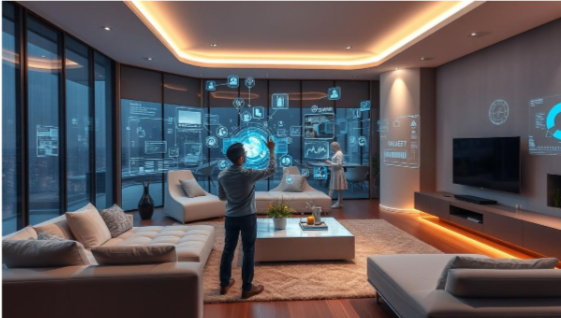Urban landscapes are changing rapidly. Cities are no longer just concrete jungles; they are evolving into intelligent ecosystems where technology and design come together. Modern living spaces are at the heart of this transformation. These homes and apartments are designed for comfort, efficiency, and connectivity. Smart cities, with their integrated systems, provide the perfect environment for these spaces to thrive. Living in such environments offers more than just convenience—it enhances overall quality of life.
Integration Of Technology In Modern Living Spaces
Modern living spaces are built to incorporate technology seamlessly. From smart lighting to automated climate control, these homes adjust to residents’ needs. Voice-activated assistants and smart appliances make daily routines easier. Technology not only saves time but also improves energy efficiency. In a smart city, infrastructure supports these innovations, allowing homes to communicate with public systems like traffic management or energy grids. The integration of technology in modern living spaces ensures that life feels both effortless and connected.
Enhanced Comfort And Design In Modern Living Spaces
Comfort is no longer a luxury; it’s a priority in modern living spaces. Designers focus on maximizing natural light, open layouts, and ergonomic furniture. Minimalist aesthetics and sustainable materials create calming environments. Smart cities complement these designs by providing green spaces, quiet zones, and accessible amenities. Residents experience not only physical comfort but also mental well-being. The modern living spaces offer a holistic approach to everyday life where comfort and design work hand in hand.
Energy Efficiency And Sustainability Benefits
Modern living spaces are synonymous with sustainability. Energy-efficient appliances, insulation, and renewable energy options reduce environmental impact. Smart meters track usage, helping residents make informed choices. Urban planning in smart cities further enhances sustainability by integrating public transportation, green roofs, and water management systems. Choosing a modern living space means embracing a lifestyle that is both responsible and forward-thinking.
Community And Connectivity Advantages
Living in a smart city transforms social dynamics. Modern living spaces often include shared amenities like gyms, co-working areas, and rooftop gardens. These features encourage interaction among residents and foster a sense of community. High-speed internet and digital platforms connect neighbors and local services seamlessly. This connectivity extends beyond the home, creating a networked community where information and resources are easily accessible.
Safety And Security Features
Safety is a critical aspect of modern living spaces. Advanced surveillance systems, secure access controls, and emergency response technologies protect residents. Smart city infrastructure complements these features by providing real-time monitoring and rapid assistance. Residents can feel secure in their homes while enjoying the benefits of urban living. The combination of advanced home security and city-level safety measures makes modern living spaces particularly attractive to families and professionals alike.
Health And Wellness Enhancements
Health and wellness are increasingly prioritized in modern living spaces. Indoor air quality sensors, ergonomic designs, and fitness facilities contribute to overall well-being. Smart cities add value with accessible healthcare, walking paths, and pollution monitoring. Residents experience a lifestyle that balances work, recreation, and relaxation. Investing in modern living spaces means choosing an environment that supports both physical and mental health.
Conclusion
Modern living spaces in smart cities represent a new era of urban life. They combine technology, comfort, sustainability, and community to create environments that enhance every aspect of living. From energy efficiency to wellness-focused designs, these homes offer far more than shelter—they offer a lifestyle. As cities continue to evolve, modern living spaces will play a central role in shaping how we live, work, and connect with the world around us.

